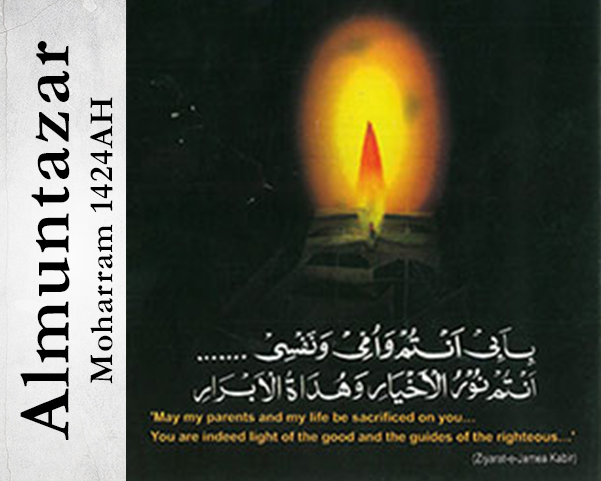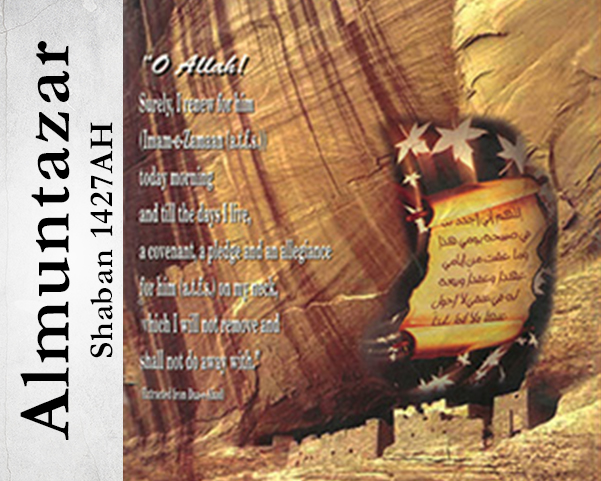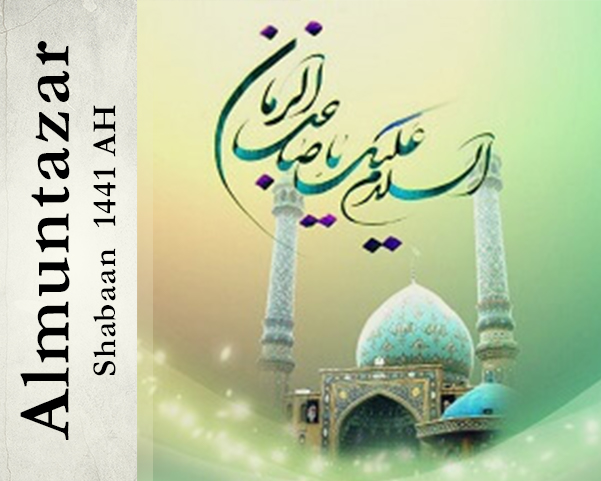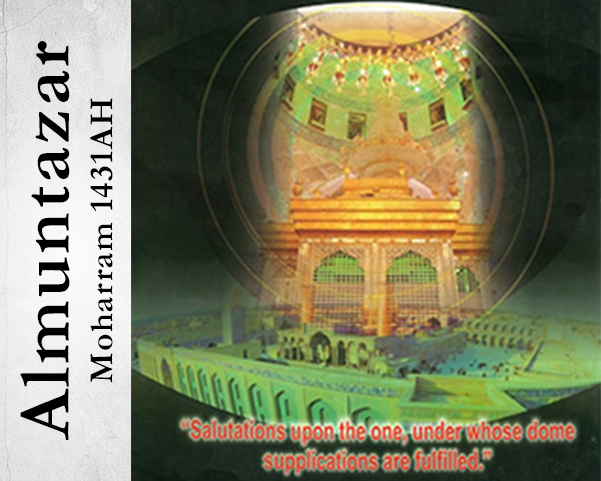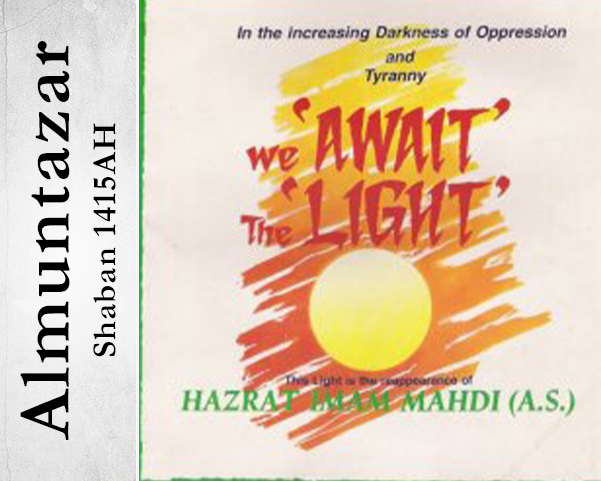The traditions of the Holy Prophet (s.a.w.a.) prophesizing the martyrdom of Imam Husain (a.s.) has been recorded in Shia and Sunni books alike. Here we shall confine our discussion to the traditions related from Sunni sources:
(1) Ibn Sa’ad and Tabrani have related from Ayesha that the Holy Prophet (s.a.w.a.) has said:
“Jibraeel has informed me that after me my son Husain (a.s.) will be slain on the land of Taff. He (Jibrael) brought the soil of that land to me and said that he will be buried underneath this soil.”
Mulla Ali Qaari has recorded the tradition with more details and Khalili has narrated the same in Irshaad with these words:-
“…….this soil belongs to that earth.”
Same tradition has been related from Ayesha with these words:”Certainly
Jibraeel showed me the soil of the earth where Husain will be killed. Then the wrath of Allah will be severe on those who spilled his blood.”
(Sawaeq, p. 190-91; Kanzul Ummal, vol. 2, p. 223)
(2) Abu Baud and Hakim have narrated from Umme Fazl binte Harith that the Holy Prophet (s.a.w.a.) has said:
“Jibraeel came to me and informed me that my Ummat will kill my son Husain and he gave me little bit of that blood-stained reddish soil.”
(Sawaeq, p. 19; Maqtale-Kkwarazmi, p. 152)
(3) Tabrani and Abu Yaali have narrated from Zainab binte Jahash that the Holy Prophet (s.a.w.a.) said:
“Jibraeel brought the news to me that my Ummat will kill this son (Husain) of mine. When I asked for the soil of that earth, he handed over the reddish soil to me.”
(Kanzul Ummal, vol. 2, p. 223)
(4) Ahmad bin Hanbal has related from the Holy Prophet (s.a.w.a.) that:An angel came in my house who had never come before. Then he addressed me and said:- “This son (Husain) of yours will be killed and if you wish I can bring the soil of that place, and then he gave a bit of reddish soil in my hand.”
(Sawaeq, p. 190)
(5) Ibne Sa’ad narrates from Umme Salma who narrates from the Holy Prophet (s.a.w.a.) that: “Jibraeel informed me that my son Husain will be killed in the land of Iraq. When I said show me the soil of the earth where he will be killed, he brought the soil and said here is the soil.”
Ibn Asaakir has also narrated the tradition from Umme Salma with these words:-“…..wrath of Allah be upon his killer.”
(Kanzul Ummal, vol. 2, p. 223)
(6) Ibne Sa’ad has narrated from Sho’bi that: “When Hazrat Ali (a.s.) was going towards Siffin, he passed from Karbala. When he reached the village ‘Nainawa’, located near Furat, and inquired it’s name, he was told that it is known as ‘Karbala’. At this he wept so much that the earth became wet. Abdullah ibne Yahya narrated from his father who was a slave of Hazrat Ali (a.s.) that:”Be patient O Aba Abdillah, be patient O Aba Abdillah, be patient O Aba Abdillah, by the river of Furat.”
He continued that, I visited the Holy Prophet (s.a.w.a.) when he was weeping. When I inquired about the reason for weeping, he said: “Once Jibraeel told me that my son Husain will be killed in the vicinity of Furat, at a place called Karbala . Then Jibraeel brought out a handful of soil whose fragrance was coming up to my nostrils. After smelling this fragrance, tears came in my eyes.” Ahmad bin Hanbal and Ibne Zahaq has narrated this tradition from Hazrat Ali (a.s.).
(7) Khwarizmi has narrated that Abu Ali Bairhaqi has quoted in his history that the Holy Prophet (s.a.w.a.) addressed Imam Husain (a.s.) and said:
“Certainly a special grade has been reserved for you in paradise which cannot be attained without martyrdom.”
Abu Ali Islami says:
“When the army of enemies started gathering to fight Imam Husain (a.s.), then he understood that he would be slain and he bore it patiently.”
(Maqtale Khwarizmi, p. 170)
(8) Sibt ibn Jauzi narrates that when Imam Husain (a.s.) reached Karbala, he inquired about the name of the place and he was told that it is Karbala, and is also known as Nainawah, which is the name of the village. Imam Husain (a.s.) wept at this and said: “This is the land of distress and restlessness.”
Janabe Umme Salma has told me that once when Jibraeel came to the Holy Prophet (s.a.w.a.), you were with me. Then the Holy Prophet (S.A.) called you near and made you sit on his lap. Then Jibraeel inquired of him: “Do you hold him dear?”
The Holy Prophet (s.a.w.a.) replied: “Yes, of course.”
Jibraeel said: “Your Ummat will kill him and if you wish I will show you the place where he will be slain” and then Jibraeel showed the land of Karbala. Hence when Imam Husain (a.s.) was told that this is the land of Karbala , then he smelled the soil and said: “This is the same land, of which Jibraeel has informed the Holy Prophet (s.a.w.a.), where I will be killed.”
And as narrated in another tradition that he took a handful of soil from there and smelled it – same tradition has been narrated by Ibn Sa’ad in Tabaqat through Waqedi.
(Tazkiratul Khwas, p. 259-260)
Ibn binte Munie has narrated two traditions from Umme Salma in this chapter.
(Zakhaaerul Uqba, p. 147-148)
(9) Ibn Aseer and Tabari have narrated from Fuzarah that:
“Zohair ibn Qain Bajalee who was a partisan of Usman went for Hajj in the same year when Imam Husain (a.s.) left for Iraq.
“While returning he met the caravan of Imam Husain (a.s.) on his way. Since he was a friend of Usman he was loathe to remain with the caravan of Imam Husain (a.s.). But one day, coincidentally when Imam Husain (a.s.) came out of his tent, he also came out and Imam (A.S.) saw him.”
Fuzarah continues:- “Once when we were having our breakfast, a messenger of Imam Husain (A.S.) came and said:
‘O Zohair, Imam Husain (a.s.) has sent me with a message that he wishes to see you.’ We left the morsel in our hand with utter surprise, because Zohair was loathe to meet him. Dailam binte Amr, wife of Zohair, said in a fiery tone: ‘Subhan
Allah, the son of the Holy Prophet (s.a.w.a.) calls you through a messenger and you do not want to go. At this Zohair went to Imam Husain (a.s.), albeit
unwillingly. When he returned, after a while, his face was beaming with joy. He erected his tent near to the tents of Imam Husain (A.S.) and said: ‘I have
decided that I will accompany and defend him even at the cost of my life.’
His wife while bidding him farewell said: ‘May God bless you with goodness, I have a humble request from you that on the day of Qiyamat remember me in the presence of the grandfather of Husain.’
Then Zohair turned towards his companions and said:
‘Whosoever from amongst you wishes to accompany me can come along and whoever wishes to part then this is my last tryst with him. I will tell you one incident. We have been to the city of Balkhajer , which is in Turkey for
participating in a battle. There the Almighty blessed us with a victory. We
gained a lot of booty of war and we were very happy with it. Salman Farsi said: ‘If you get an opportunity to stay in the company of the youth of Ale-Mohammad and fight in their company then that pleasure and joy will be by far surpassing than this war-booty. I assign you to God.’ Then he joined Imam Husain (a.s.) and laid down his life for him. Kamil and Ibn Aseer have quoted another version of Salman’s saying. It is as follows:
‘If you reach the times of the chief of the Youths of Ale-Mohammad then the pleasure of fighting along with them will be much more than today’s war-booty.’ And Tabari has written Salman Bahuli instead of Salman Farsi and it seems to be more correct because Salman Bahuli was killed in Balkhajer.
(Summul-Mane, pg. 141; Al-Kamil, vol. 3, pg. 277; Talari, vol. 14, pg. 299.)
(10) Ibn Aseer has related from Ghurfa Azdi, who was a companion of the Holy Prophet (s.a.w.a.) that:
“There arose a doubt in my heart regarding the status of Hazrat Ali (a.s.). Hence I followed him when he moved towards the side of river Furat. Hazrat Ali (a.s.) stood at a side. We all too stood around him. Then he signaled from his hand and said: ‘This place is the habitat of camels, their riders and other animals. This is also a place where blood will be spilled. My father be their ransom nobody from the earth and skies will be their helper except Allah.’
Ghurfa says that “When Husain (a.s.) was killed; I reached at the spot where they were killed. I saw it was the same place which Hazrat Ali (a.s.) had shown to us. There was not the slightest difference in it. He adds: I seek forgiveness from God for that doubt and I have gained certitude that Hazrat Ali (a.s.) does not take any step without the will of God.”
(Asadul-Ghaba, vol. 4. pg. l69).
(11) Dailami has related from Ma’az that the Holy Prophet (s.a.w.a.) said:
“I am aware of the martyrdom of Husain, I have seen the soil of the place (of
martyrdom) and I have also been informed of his killers.”
(Kanzul Ummal, vol. 6, pg. 223)
(12) Ibn Asaakir has related from Ibn Amr that the Holy Prophet (s.a.w.a.) has said: “May Allah deprive the wretched Yazid of His mercy. Know that I have been informed about the martyrdom of my beloved Husain and also the sand of his grave is brought unto me. I have seen his assassins. Know that Husain has not been slain among those who do not love him but the wrath of Allah be upon them.”
(13) Baihaqi has quoted a tradition from the Holy Prophet (s.a.w.a.) that he prophesized about the martyrdom of Imam Husain (A.S.) that “He will be martyred at a place near Kufa called Taff.”
(As-Sirato Nabviyah, vol. 3, pg.220)
(14) Yakubi has written that: “The foremost in Medina who mourned on the calamity of Imam Husain (a.s.) was the wife of the Holy Prophet (s.a.w.a.), Janabe Umme Salma because the jar in which the sand of Karbala was kept was given to her by the Holy Prophet (s.a.w.a.) and he had told her: ‘Jibraeel has informed me that my Ummat will kill Husain and then he gave me the sand. When this sand will turn into fresh blood then understand Husain has been slain.’ That sand was with Umme Salma. When Imam Husain (a.s.) left for Iraq then she used to always look at it. Once when that sand turned into blood, she started wailing aloud. When other women saw her crying even they joined her in the mourning. The whole city was agog with mourning in such a way, as it was never before.”
(Tarikhe Yaqubi, vol. 2, pg. 218, 219)
Ibn Hajar has related from Mulla Ali Qari in Sawaeqe Mohreqa and Ibn Hanbal in his Musnad has recorded the same with a minor difference that “that sand was of the very spot where Imam Husain (A.S.) was slain.”
(Sawaeqe-Wloliarreqa, pg. 191)
The traditions from the Holy Prophet (s.a.w.a.) are in abundance which state that he has foretold all the incidents, including the fate of the assassins. Now it is not known why some people are averse to the events of Karbala ? Why they shun this sunnat of the Holy Prophet (s.a.w.a.)? Why they carp and criticize those who narrate the events of Karbala ?











